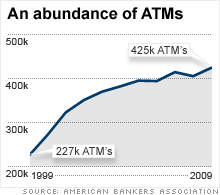NEW YORK (CNNMoney.com) -- As Congress debates the new rules of the road for the U.S. banking industry, some lawmakers have an ambitious proposal: They want to cut ATM fees.
Last week, a trio of Democratic senators led by Iowa's Tom Harkin proposed capping automated teller machine fees at just 50 cents.
 |
| The number of cash-dispensing machines located across the country has nearly doubled in a matter of a decade. |
Currently, banks and other ATM operators are free to charge consumers whatever they want for using their machine. And backers of the amendment maintain that those who tend feel the brunt of those fees are lower- and middle-income Americans, precisely those who can't afford it.
Indeed, ATM fees aren't cheap these days. Last year, consumers were assessed $3.54, on average, every time they used an ATM that isn't controlled by their own bank, according to Bankrate.com.
Despite this, experts suggest that the Harkin proposal is a long shot. With so many amendments vying for the attention of lawmakers to make the final draft of the financial regulatory reform bill, chances are this one will get left on the cutting room floor.
But suppose it did pass - would lower ATM fees really deliver a much-needed break for cash-strapped American consumers?
Not necessarily.
In fact, some experts suggest that capping fees might result in more harm than good for consumers.
One likely consequence would be a reduction in the number of ATMs. At the end of last year, there were roughly 425,000 cash-dispensing machines across the country, according to industry figures. About half of them were controlled by independent operators like Cardtronics (CATM) and Louisville, Ky.-based firm Payment Alliance.
Experts said these companies would be devastated by a fee cap since they earn nearly all of their revenue from charging customers that visit their machines.
Independent operators, as a result, might choose to operate only in locations that generated a lot of foot traffic, where a greater volume of transactions would offset the decline in fees. Some community lenders and credit unions might also rethink whether it's worth having so many ATMs for their customers.
Consumers, of course, might argue that a decline in the number of ATMs wouldn't necessarily be a terrible thing, given the glut of cash-dispensing machines.
But some experts fear the contraction would be far more severe than people expect.
"You could get an ATM wasteland," said Nicole Sturgill, research director in delivery channels for consulting firm TowerGroup.
Still, wouldn't some consumers be willing to tolerate fewer ATMs as a side effect of lower fees? One of the reasons consumers are angry about high ATM charges is because they are paying extra simply to access their own checking or savings accounts.
Industry groups are quick to point out that the fees are necessary and help to cover a wide variety of costs involved with setting up and running an ATM.
According to industry figures, it costs between $9,000 to $50,000 to purchase an ATM. Banks and other operators then have to pay an additional $12,000 to $15,000 annually to keep the machine running.
What consumer advocates have taken issue with however, is that some banks and ATM operators charge far beyond the simple processing fee.
The Harkin amendment estimates that it only costs banks somewhere in the neighborhood of 36 cents to carry out an ATM transaction - far less than what consumers typically pay.
"Banks shouldn't be able to turn accessing your own money into a profit center," said Jean Ann Fox, director of financial services for the Consumer Federation of America.
Experts suggest that number is a little bit low, but not that far off.
What does trouble them however are some of the other unintended consequences from capping ATM fees, including stifling innovation.
Operators may no longer see the value, for example, in offering the latest technology such as allowing consumers to email receipts.
Even more worrisome is the possibility that banks could decide to impose a fee on all of their ATM users in order to compensate for the costs of running their ATMs, notes TowerGroup's Sturgill.
"When you use another bank's ATM you are helping defray the costs for everyone using that ATM," she said. "I think that is a piece that gets lost in there."
Talkback: Would you be willing to travel further to get to an ATM in exchange for lower fees? Leave your comments below or click here to e-mail the reporter of this story. ![]()






| Index | Last | Change | % Change |
|---|---|---|---|
| Dow | 32,627.97 | -234.33 | -0.71% |
| Nasdaq | 13,215.24 | 99.07 | 0.76% |
| S&P 500 | 3,913.10 | -2.36 | -0.06% |
| Treasuries | 1.73 | 0.00 | 0.12% |
| Company | Price | Change | % Change |
|---|---|---|---|
| Ford Motor Co | 8.29 | 0.05 | 0.61% |
| Advanced Micro Devic... | 54.59 | 0.70 | 1.30% |
| Cisco Systems Inc | 47.49 | -2.44 | -4.89% |
| General Electric Co | 13.00 | -0.16 | -1.22% |
| Kraft Heinz Co | 27.84 | -2.20 | -7.32% |
|
Bankrupt toy retailer tells bankruptcy court it is looking at possibly reviving the Toys 'R' Us and Babies 'R' Us brands. More |
Land O'Lakes CEO Beth Ford charts her career path, from her first job to becoming the first openly gay CEO at a Fortune 500 company in an interview with CNN's Boss Files. More |
Honda and General Motors are creating a new generation of fully autonomous vehicles. More |
In 1998, Ntsiki Biyela won a scholarship to study wine making. Now she's about to launch her own brand. More |
Whether you hedge inflation or look for a return that outpaces inflation, here's how to prepare. More |